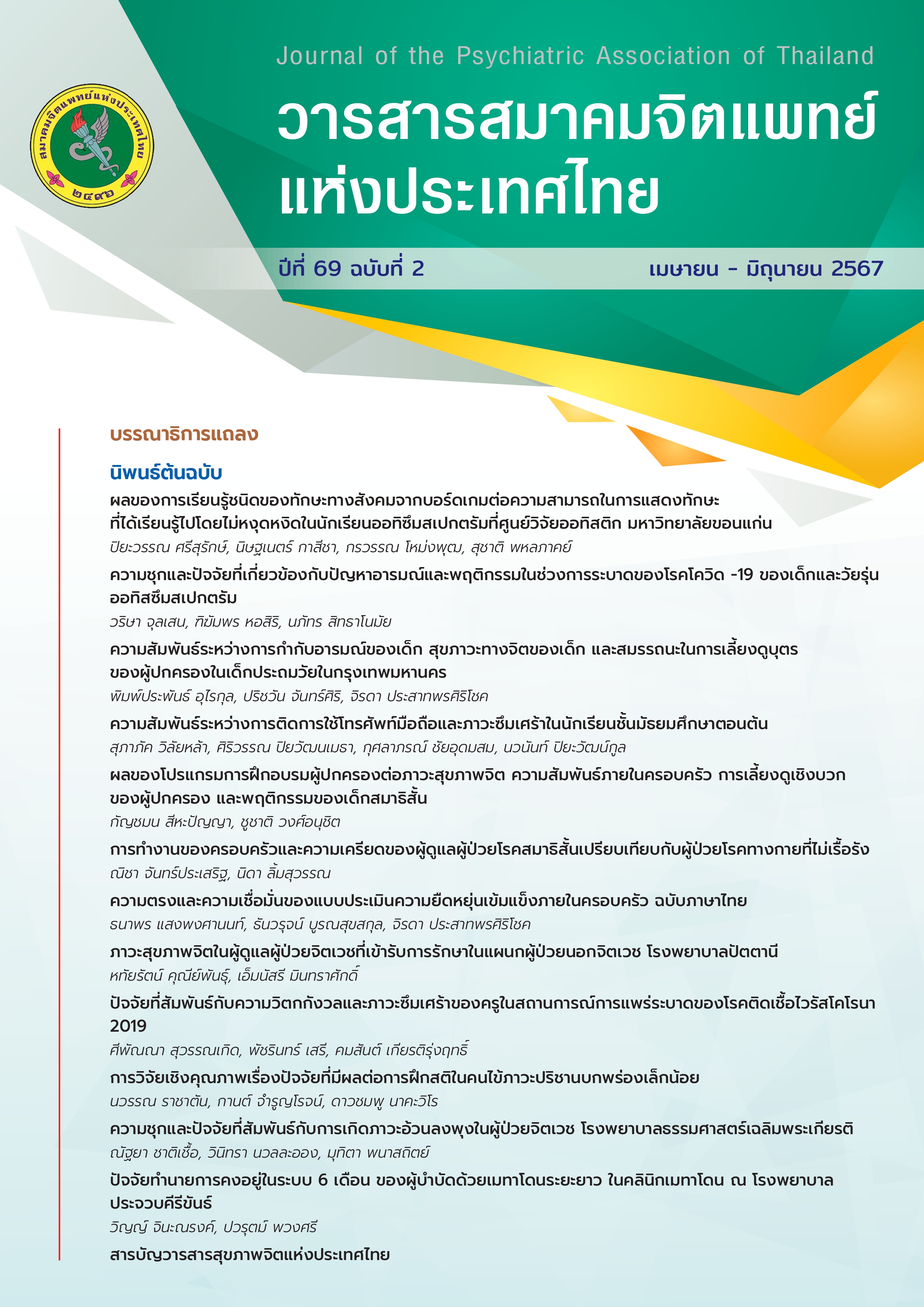Family Functioning and Caregiver Stress in Attention-Deficit/ Hyperactivity Disorder (ADHD) Comparing to Non-Chronic Physical Illness
Main Article Content
Abstract
Objective: To specifically investigate the family functioning and caregiver stress in the family with ADHD comparing to the family with non-chronic physical illness.
Method: A cross-sectional study consisted of 97 subjects in ADHD group and 101 subjects in non-chronic physical illness group.
Results: The comparison of the family functioning between ADHD and non-chronic physical illness group demonstrated significantly poorer family functioning in ADHD group than physical illness group on difficulties, communication and the general family functioning. Moreover, higher caregiver stress in ADHD group than physical illness group was demonstrated. In addition, the significant associations between clinical groups, difficulties, communication, general family functioning and caregiver stress were reported. Furthermore, the positive associations between all dimensions of family functioning, general family functioning and caregiver stress were significant.
Conclusion: ADHD group had poorer family functioning and higher caregiver stress level than physical illness group. Family interventions potentially have benefits for ADHD population.
Article Details

This work is licensed under a Creative Commons Attribution-NonCommercial-NoDerivatives 4.0 International License.
Articles submitted for consideration must not have been previously published or accepted for publication in any other journal, and must not be under review by any other journal.
References
Salari N, Ghasemi H, Abdoli N, Rahmani A, Shiri MH, Hashemian AH, et al. The global prevalence of ADHD in children and adolescents: a systematic review and meta-analysis. Ital J Pediatr 2023;49(1):48.
American Psychiatric Association. The Diagnostic and Statistical Manual of Mental Disorders, Fifth Edition, Text Revision (DSM-5-TR). American Psychiatric Association Publishing; 2022.
Zhao X, Page TF, Altszuler AR, Pelham WE, 3rd, Kipp H, Gnagy EM, et al. Family burden of raising a child with ADHD. J Abnorm Child Psychol 2019;47(8):1327-38.
Miller IW, Ryan CE, Keitner GI, Bishop DS, Epstein NB. The McMaster approach to families: theory, assessment, treatment and research. J Fam Ther 2000;22(2):168-89.
Choksomngam Y, Jiraporncharoen W, Pinyopornpanish K, Narkpongphun A, Ongprasert K, Angkurawaranon C. Associations between family functioning and symptoms of attention-deficit hyperactivity disorder (ADHD): A cross-sectional study. Healthcare (Basel). 2022;10(8).
Öztürk F, Ekinci M. The effect of psycho-education given to mothers of children with attention deficit hyperactivity disorder on mother-child interaction and family functionality. J Child Adolesc Psychiatr Nurs 2023;36(4):299-306.
Uran P, Kılıç BG. Family functioning, comorbidities, and behavioral profiles of children with ADHD and disruptive mood dysregulation Disorder. J Atten Disord 2020;24(9):1285-94.
Young ME, Galvan T, Reidy BL, Pescosolido MF, Kim KL, Seymour K, et al. Family functioning deficits in bipolar disorder and ADHD in youth. J Affect Disord 2013;150(3):1096-102.
Pimentel MJ, Vieira-Santos S, Santos V, Vale MC. Mothers of children with attention deficit/hyperactivity disorder: relationship among parenting stress, parental practices and child behaviour. Atten Defic Hyperact Disord 2011;3(1):61-8.
Mullins LL, Wolfe-Christensen C, Pai AL, Carpentier MY, Gillaspy S, Cheek J, et al. The relationship of parental overprotection, perceived child vulnerability, and parenting stress to uncertainty in youth with chronic illness. J Pediatr Psychol 2007;32(8):973-82.
Carr A, Stratton P. The score family assessment questionnaire: A decade of progress. Fam Process 2017;56(2):285-301.
Limsuwan N, Prachason T. The reliability and validity of the 15-item Systemic Clinical Outcome and Routine Evaluation (SCORE-15) Thai version. J Fam Ther 2020;42(1):119-28.
Limsuwan N, Prachason T. Psychometric properties of the SCORE-15 Thai version and its relationship with mental health index. J Fam Ther 2022;44(2):299-312.
Cohen S, Kamarck T, Mermelstein R. A global measure of perceived stress. J Health Soc Behav 1983;24(4):385-96.
Wongpakaran N, Wongpakaran T. The Thai version of the PSS-10: An investigation of its psychometric properties. Biopsychosoc Med 2010;4:6.
Pityaratstian N, Booranasuksaku T, Juengsiragulwit D, Benyakorn S. ADHD screening properties of the Thai Version of Swanson, Nolan, and Pelham IV Scale (SNAP-IV) and Strengths and Difficulties Questionnaire (SDQ). J Psychiatr Assoc Thailand 2014;59:97-110.
Stratton P, Bland J, Janes E, Lask J. Developing an indicator of family function and a practicable outcome measure for systemic family and couple therapy: the SCORE. J Fam Ther 2010;32(3):232-58.
Sibley M, Evans S, Serpell Z. Social cognition and interpersonal impairment in young adolescents with ADHD. J Psychopathol Behav Assess 2010;32:193-202.
Grossman A, Avital A. Emotional and sensory dysregulation as a possible missing link in attention deficit hyperactivity disorder: A review. Front Behav Neurosci 2023;17:1118937.


